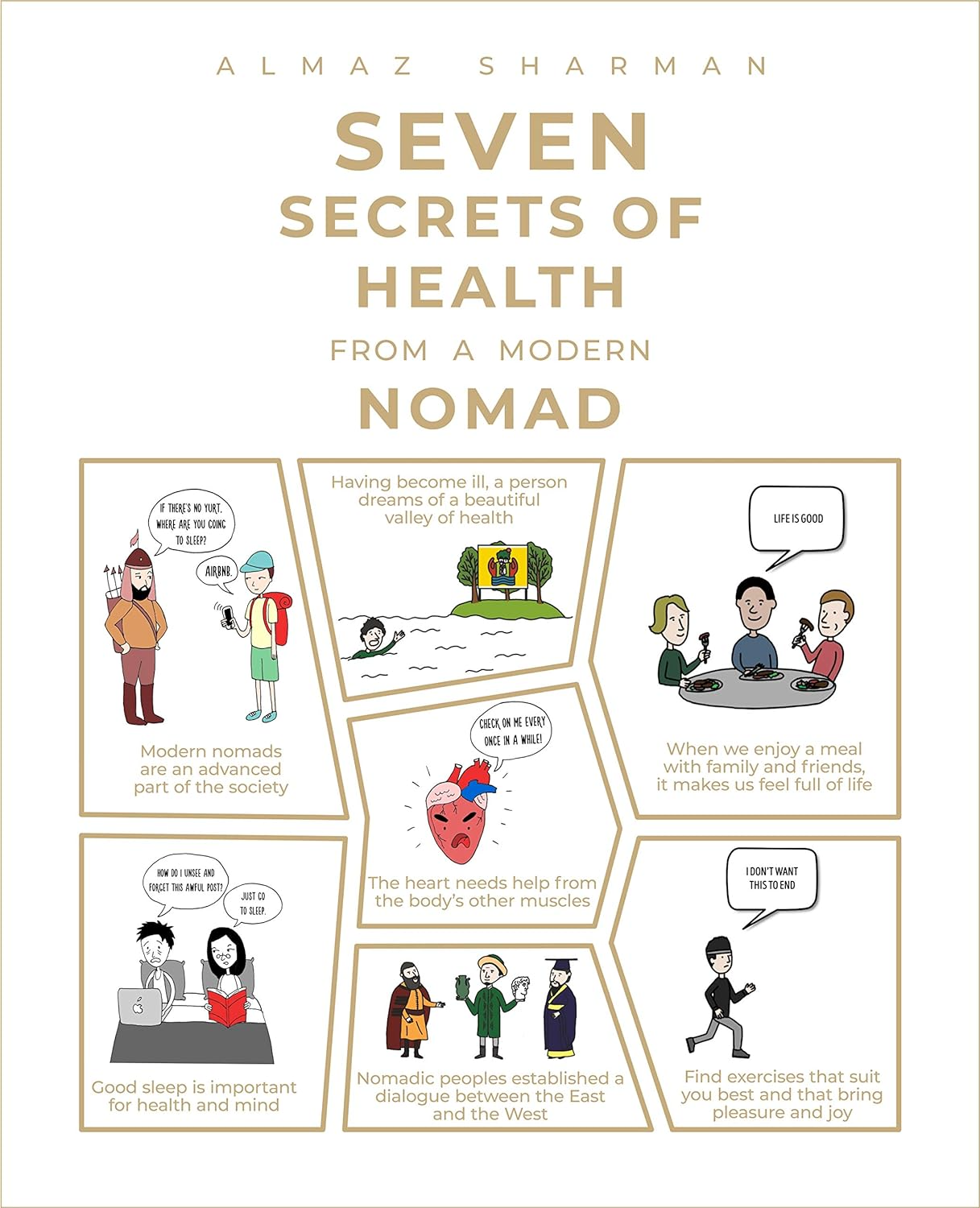
Seven Secrets of Health From a Modern Nomad
Seven Secrets of Health From a Modern Nomad
“Seven Secrets of Health from a Modern Nomad” is devoted to the fundamental principles of intuitive health, which Dr. Almaz Sharman came to realize after many years of scientific research and everyday experience.
The author is an American doctor, native Kazakh. For thousands of years, his nomadic ancestors traversed the open Kazakh steppe, a territory exceeding Western Europe in size. There is a hypothesis that many centuries ago, the ancient Kazakh tribes were the first to settle America, having crossed the Bering Strait and passed through thousands of miles of prairie, the Rocky Mountains, and the Appalachians. This is the place where the spirit of the steppes met the winds of the prairies.
Nomads have made an invaluable contribution to world history. The domestication of horses, which occurred about six millennia ago in the territory of present-day central Kazakhstan, as well as the technology of food preservation invented by nomads laid the foundation for the mobility and food security of mankind.
Dr. Sharman has come to find that for sustainable health, it is important to feel the joy of movement, enjoy live food and clean water, overcome stress through proper sleep and harmonious relationships with loved ones, and use intuition to identify and prevent diseases in a timely manner.
These principles were professed by nomads, for whom constant movement was the essence and meaning of existence. A special place in their lives was occupied by harmonious relationships with nature and loved ones as well as spiritual values and the continuity of generations.
The recommendations the author makes in this book with regard to how to achieve constant physical activity, enjoy food without thinking about being overweight, individual characteristics of sleep, sports experiences, attitudes toward alcohol, and more are largely drawn from his personal experiences. The author also shares the hypothesis of how bacteria once populated the intestines and became our allies in the fight against disease, and how viruses embedded in our genes, creating cancer risk. The book is illustrated with many cartoons that explain the author’s key messages.
Health is a path with many obstacles that can be circumvented – you just need to know where these obstacles are and take reasonable efforts to get around them. This book provides many answers to those who are interested in sustainable health and quality of life.
- Сипаттамасы
- Пікірлер
“Seven Secrets of Health from a Modern Nomad” is devoted to the fundamental principles of intuitive health, which Dr. Almaz Sharman came to realize after many years of scientific research and everyday experience.
The author is an American doctor, native Kazakh. For thousands of years, his nomadic ancestors traversed the open Kazakh steppe, a territory exceeding Western Europe in size. There is a hypothesis that many centuries ago, the ancient Kazakh tribes were the first to settle America, having crossed the Bering Strait and passed through thousands of miles of prairie, the Rocky Mountains, and the Appalachians. This is the place where the spirit of the steppes met the winds of the prairies.
Nomads have made an invaluable contribution to world history. The domestication of horses, which occurred about six millennia ago in the territory of present-day central Kazakhstan, as well as the technology of food preservation invented by nomads laid the foundation for the mobility and food security of mankind.
Dr. Sharman has come to find that for sustainable health, it is important to feel the joy of movement, enjoy live food and clean water, overcome stress through proper sleep and harmonious relationships with loved ones, and use intuition to identify and prevent diseases in a timely manner.
These principles were professed by nomads, for whom constant movement was the essence and meaning of existence. A special place in their lives was occupied by harmonious relationships with nature and loved ones as well as spiritual values and the continuity of generations.
The recommendations the author makes in this book with regard to how to achieve constant physical activity, enjoy food without thinking about being overweight, individual characteristics of sleep, sports experiences, attitudes toward alcohol, and more are largely drawn from his personal experiences. The author also shares the hypothesis of how bacteria once populated the intestines and became our allies in the fight against disease, and how viruses embedded in our genes, creating cancer risk. The book is illustrated with many cartoons that explain the author’s key messages.
Health is a path with many obstacles that can be circumvented – you just need to know where these obstacles are and take reasonable efforts to get around them. This book provides many answers to those who are interested in sustainable health and quality of life.


